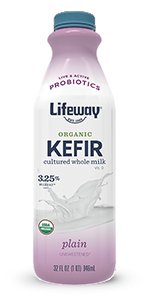Our Mediterranean-inspired kefir bowl infuses both the flavors and ingredients of fresh green veggies, savory couscous, and a cucumber kefir sauce into one meal. Plus, you’ll get the benefits from what U.S. News and World Report ranked as the best and most sustainable diet – the Mediterranean diet, which focuses on fresh ingredients like vegetables, whole grains, and high-quality dairy.
Cultured Dairy: The Nutrition Benefits You Actually Need to Know
With increasing research linking the correlation between probiotics, gut health, and immunity, it’s no secret that the integrity of our gut is vital to our health. Although additional factors such as stress, antibiotic usage, and individual health conditions can contribute to the condition of our gut, a focus on healthy food choices is one of the easiest ways to support the microbiome.
Several studies have shown a strong association between the gut-brain-microbiota. Probiotics introduced to the gut have been found to support immunity, improve allergies, and improve digestion.
Studies have shown that reduced diversity of healthy gut bacteria during early years is associated with an increase in food allergies during school age years. In addition, kefir made from whole fat milk helps absorb key nutrients such as Vitamins A, D, E, and K. Vitamin K is important because it helps your bones absorb calcium. It’s important to know that kefir contains a special trio: vitamin D, K, and calcium – all three crucial elements to support bone health.
Prebiotics + Probiotics = a Healthy You
Prebiotics are non-living, non-digestible carbohydrates naturally found in a variety of foods. Your body actually can’t digest prebiotics, so they’re what probiotics feed off of to remain actively working in your digestive system. They help the digestive system by promoting the growth of good bacteria. Prebiotics and probiotics work together in balance to make sure our digestive system stays on track and regular. Research has found that consuming a variety of prebiotic and probiotic food sources may improve your body’s natural functions, including both your immune and digestive system.
Servings: 1 - 2Ingredients
Kefir Sauce
- 1/4 cup seeded and peeled cucumber, finely chopped
- 1 cup Organic Whole Milk Plain Kefir
- 1/4 teaspoon dried dill
- 1 clove garlic, minced
- salt/pepper
Main Salad Ingredients
- 3/4 cup couscous
- 1 15 ounce. can chickpeas, drained, rinsed and patted very dry with towel
- 1 teaspoon oil
- 1/4 teaspoon cayenne pepper
- 1/2 teaspoon ground cumin
- 1/4 teaspoon smoked paprika
- 1/2 red onion, thinly sliced
- 1/4 cup red wine vinegar
- 1/4 teaspoon coriander seeds
- 1/3 cup fresh parsley, chopped
- 1/3 cup fresh mint, chopped
- 1 cup chopped tomatoes
- 1/2 cup chopped cucumber
Directions
- Cook couscous according to package directions. Fluff with a fork, then set aside to let cool while you prepare the rest of the ingredients.
- Preheat the oven to 400 degrees. Toss the dry chickpeas with olive oil, then spread in a single layer on a baking sheet. Let cook for 30 minutes until crispy, then toss with cayenne, cumin and paprika.
- Mix together the thinly sliced onions, red wine vinegar and coriander seeds in a bowl. Place a smaller bowl on top of the onions, then place a heavy object on top to marinate for at least 15 minutes.
- Make the yogurt sauce: toss together the yogurt, finely chopped cucumber, dill, garlic and pinch salt and pepper. Season to taste, as needed, and set aside.
- When ready to serve, add the parsley and mint to the couscous. Divide among 4 bowls, then add the chickpeas, tomatoes, pickled onions and cucumbers. Spoon kefir sauce on top and serve.

